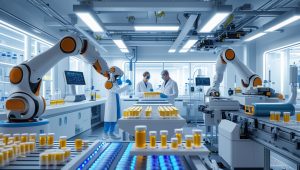
The pharmaceutical industry is undergoing a major transformation, with automation playing a central role in revolutionizing how medicines are researched, manufactured, and delivered. In the era of Next Gen Pharma, automation is not just a tool for efficiency—it is a strategic asset that enhances accuracy, speed, and scalability across the entire pharmaceutical value chain.
Smarter and More Consistent Drug Manufacturing
One of the most visible applications of automation in pharma is in drug manufacturing. Traditional processes relied heavily on manual labor, which was time-consuming and prone to human error. Today, the integration of robotics, automated sensors, and intelligent control systems allows for faster, safer, and more precise production.
Automated systems can handle everything from mixing active ingredients to packaging and real-time quality control. This increases batch consistency, reduces waste, lowers operational costs, and ensures that each unit meets strict regulatory standards.
Accelerating Research and Development
In the R&D phase, automation is transforming how scientists conduct experiments. Automated lab platforms can run hundreds of tests simultaneously, significantly reducing the time required for compound screening and formulation trials.
By automating repetitive laboratory tasks, researchers can focus on analyzing data and refining hypotheses rather than spending time on manual testing. This leads to faster discovery cycles and a more streamlined path from concept to clinical trial.
Optimizing Distribution and Supply Chain
Automation also plays a critical role in pharmaceutical logistics and distribution. Automated warehouse management systems enable real-time inventory tracking, accurate order fulfillment, and efficient storage solutions. Robotics and automated sorting systems help reduce human error and ensure timely delivery.
Additionally, technologies like IoT (Internet of Things) are being used to monitor environmental conditions such as temperature and humidity during transportation—vital for sensitive products like biologics and vaccines. This ensures the integrity and safety of medicines throughout the supply chain.
Enhancing Safety and Regulatory Compliance
Regulatory compliance is a major concern in the pharmaceutical industry. Automation helps by creating digitally recorded, traceable processes that simplify audits and inspections. Every step in manufacturing and distribution can be documented and retrieved easily.
In hospitals and pharmacies, automated dispensing systems and robotic pill counters reduce the risk of human error in medication handling, improving patient safety and minimizing prescription mistakes.